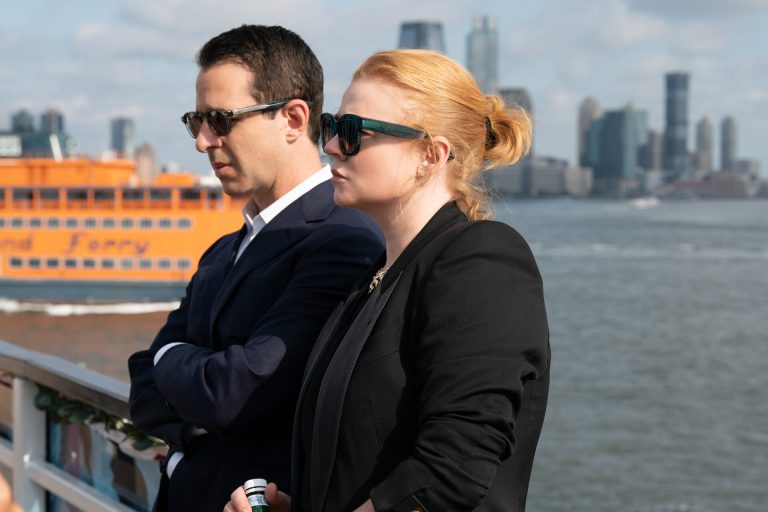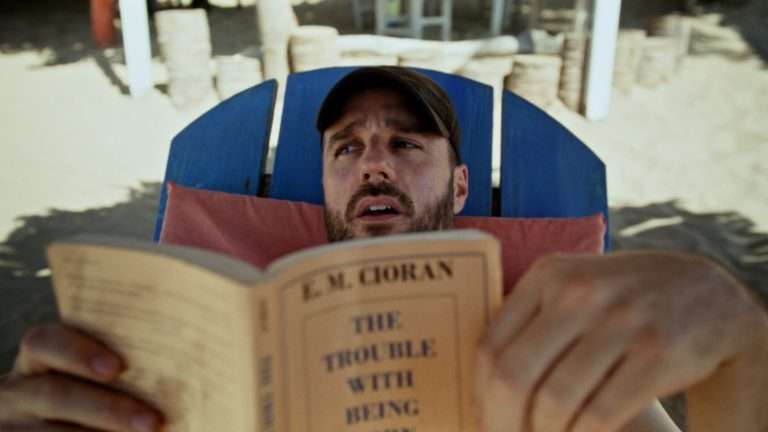Succession: How “America Decides” Deconstructs Corporatocracy: In real life, most people don’t change. We, humans, find it extremely challenging and difficult whenever we are head-on faced with an ideology or a way of living that fundamentally disrupts ours. But that doesn’t make for exciting drama, let alone a prestige one. HBO’s “Succession” maintains its strong footing even in its final season precisely because of how well it understands that. The success of crafting an hour of television that is always captivating and suspenseful, with mere individuals moving in and out of cabins while passing phones back and forth, is a testimony to the show’s cast and crew.
But creator Jesse Armstrong elevates the drama by acknowledging how the Roy kids are fundamentally incapable of going through any internal change. It’s through the shift in their external dynamics and by changing the stakes around the Roy family that “Succession” transcends itself into being a great tragedy. For instance, Roman Roy – now the co-CEO of Waystar Royco – doesn’t really change much through the course of the four seasons. In this week’s episode of Succession, “America Decides,” he basically ends up leveraging the leads of a fascist politician called Jeryd Mencken to maximize the conglomerate’s capital. It’s the same thing that Roman from earlier seasons would’ve done (think of the first time he meets Mencken), only if he had been given the position.
It’s election night, and ATN executives are looking closely at the numbers while making sure they get their ratings right. Tom, the Chairman of Global Broadcast News at the channel, is understandably under extreme stress. He needs Greg to get him coffee because if Tom fails to remain mindful, he might get so sleepy that he will miscall Colorado, which obviously will lead to nuclear war and the end of civilization as we know it – according to him, of course. “It’s a long way back from pond life because you failed to get me a double shot!” he shouts. Thus, all the major characters start gravely overestimating their own influence and power over the crucial evening at first.
But we already know how the Roy kids fundamentally find it difficult to see themselves as wrong while operating in a bubble of their own. At a time when corporate influence is killing most capitalist nations, watching it happen on this episode felt worse than simply imagining it. We watch personal betrayals, and family issues seep into national politics, knowing all too well that it’s further bound to spill its blood globally.
Gradually, there’s a shift in the way characters interact and respond to tasks handed to them, including Tom. Everyone starts trying to wash their hands regarding their involvement in the decision-making done by the Failsons. Through such inter-dynamic plot progression, writer Jesse Armstrong turns the camera on the rotten cynicism at the very core of capitalism. After masquerading as a satire through the course of its four seasons, the satire aspect finally takes a backseat here. The rationale explains the tragedy, which is precisely the fact of having lived through the history of seeing such an election night.
In doing so, the 65-minute episode frames fiscal conservatives at the helm of the network as willfully immoral; they’re willing to justify violence and fascism so long as their pockets remain full. Some, like Roman, may not really care about the consequences. “We just made a night of good TV. That’s what we’ve done. Nothing happens”, he says naively after Mencken’s absurd victory speech. The Roys may be beyond empathy, but the pandemonium around their headquarter piercingly echoes the quintessential media frenzy of today’s polarizing climate.
The phenomenal staging mostly revolves around people passing phones back and forth — and at one point, even holding a phone up to another so that the people on the lines can talk to each other. Also, notice how Kendall’s call to Nate plays out – mostly unheard on the other side of one of ATN’s enormous cabin windows, as Shiv looks on with dread in fear of her foolish bluff getting caught.
Kendall walks over to Greg, who Shiv knows is aware of her backdoor talks with Lucas Matsson, after learning through Nate that Shiv never called him regarding his extended support if ATN supports the Democratic candidate. In an era where the flow of big-scale IPs has inevitably seeped into the television, “Succession” gives us a towering episode with people sitting inside closed cabins and somehow makes it the most cinematic thing you’d watch all year.
Out of all the debacles, we learn how Roman and Kendall’s dynamic dates back to fighting over what to have for dinner when they were kids. Kendall asks him, “Because we had so much chicken when you were a kid, we have to elect a fascist?” Of course, he is being facetious, but it’s those kinds of lingering slights that guide the decision-making behind picking the potentially most powerful man. When he mentions to his brother how he fears what an outright fascist administration might mean for his adopted daughter, Sophie, Roman mocks him for adhering to the ideals of American pluralism.
Somewhere between all the psychologically rooted betrayals, perhaps the Roy kids don’t even seem to realize that their choice of picking Mencken eventually is in itself rooted in the trauma of their father’s death. “I don’t know the scale of it,” Ken admits to Shiv in person right before he chooses to settle for the Republican face. Thus, they’re all so far removed from the real world that they turn oblivious to the impact they have in altering everyone else’s lives.
A lesser show would’ve stopped at that. But the brilliance of Armstrong lies in how he immediately grounds the drama by acknowledging the reactions of his (somewhat) ordinary characters. After Tom calls Greg to go ahead with the final graphics, we get a scene of Greg and Jess standing in the corridor, trying to comprehend the gravity of the task at hand. In that brief human moment, the show channels the visceral sensation of millions of people just being dumbfounded while comprehending a populous and fascist leader’s win.
In the broader sense, “Succession” has always been a piercing commentary on dysfunctional media dynasties that place corporate interests ahead of ethics as well as journalism and the potential collateral damage that it inflicts. There are echoes of the infamous and embarrassing Bush-Gore debacle of the 2000s in “America Decides,” as the episode also implies a potential legal battle in the months to come. It reminds me of the 35-day-long unprecedented time in the year 2000 when news channels dispensed around-the-clock reports on recounts, voting irregularities, mass protests, and legal challenges that had preceded a U.S. Supreme Court decision to stop a statewide vote recount.
From recent events, there’s the inevitable overlapping of the Fox-Dominion lawsuit, which had revealed some shocking behind-the-scenes apprehensions as network officials wrestled with the fallout from their 2020 election coverage while worrying about being outflanked by other digital competitors on the right. Indian viewers watch it with further apprehension of already living through the times of a growing wave of the corporate takeover of Democratic institutions at home amidst a strong tide of fascist ideology. After a point, all the boundaries get blurred in the facade of globalism, masquerading as corporatocracy. Just like the Roy siblings’ trajectory, the endgame of that, too, stares at a much larger collapse – the splintering of which becomes apparent when narratives supersede ethics because the only thing of value remains content.
Even when ones like Kendall are able to recognize a bad apple when they see one, they still sell it at the market for full price. To the extent that “the poison drips through” these bad apples as well – as Kendall would like to put it – hence becoming its own unique brand of torture. Perhaps there could’ve been a ‘false flag’ that could’ve possibly stopped the Roy kids from driving the nation into an abyss. Alas, they won’t ever be able to have their father intervene again while they actively go on making one judgmental error after the other, all in an attempt to seek his approval from beyond the grave.
Regardless of how things play out in the remaining two episodes, watching Logan Roy’s business empire collapse so spectacularly just within days of his death would be an apt ending to a show about a dying old man who only taught his children to be ruthless killers.






